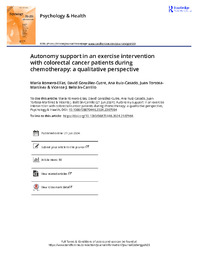Por favor, use este identificador para citar o enlazar este ítem:
https://hdl.handle.net/11000/33009Registro completo de metadatos
| Campo DC | Valor | Lengua/Idioma |
|---|---|---|
| dc.contributor.author | Romero-Elías, María | - |
| dc.contributor.author | González-Cutre, David | - |
| dc.contributor.author | Ruiz-Casado, Ana | - |
| dc.contributor.author | TORTOSA-MARTINEZ, JUAN | - |
| dc.contributor.author | Beltrán-Carrillo, Vicente J. | - |
| dc.contributor.other | Departamentos de la UMH::Ciencias del Deporte | es_ES |
| dc.date.accessioned | 2024-09-06T11:55:05Z | - |
| dc.date.available | 2024-09-06T11:55:05Z | - |
| dc.date.created | 2024-06-21 | - |
| dc.identifier.citation | Psychology & Health, jun, 2024 | es_ES |
| dc.identifier.issn | 1476-8321 | - |
| dc.identifier.issn | 0887-0446 | - |
| dc.identifier.uri | https://hdl.handle.net/11000/33009 | - |
| dc.description.abstract | Objective: Physical activity (PA) has emerged as an important element of supportive care for cancer patients, but few patients engage with exercise. Considering that autonomy support is associated with healthy lifestyles, it would be useful to know the specific autonomy-supportive techniques that can help to encourage PA in colorectal cancer (CRC) patients. This study aims to qualitatively explore autonomy support perceptions through a self-determination-theory-based exercise program (FIT-CANCER) with CRC patients during chemotherapy treatment. Methods and Measures: A total of 27 participants were included, 16 CRC patients, six relatives, and five healthcare professionals. Qualitative data from semi-structured interviews and observational field notes were analyzed with thematic analysis. Results: Three main themes were identified: Healthcare professionals encouraging enrollment in the exercise program, Relatives supporting attendance to the exercise sessions, Exercise instructor favoring adherence to the exercise program. The different subthemes showed autonomy-supportive techniques from these social agents to promote CRC patients’ participation in the exercise program. Conclusion: The present research showed the importance of autonomy support from healthcare professionals, relatives and the exercise instructor to promote the initiation and maintenance of CRC patients’ PA behavior and improve their quality of life, health and well-being. | es_ES |
| dc.format | application/pdf | es_ES |
| dc.format.extent | 20 | es_ES |
| dc.language.iso | eng | es_ES |
| dc.publisher | Taylor and Francis Group | es_ES |
| dc.rights | info:eu-repo/semantics/openAccess | es_ES |
| dc.rights | Attribution-NonCommercial-NoDerivatives 4.0 Internacional | * |
| dc.rights.uri | http://creativecommons.org/licenses/by-nc-nd/4.0/ | * |
| dc.subject | Chemotherapy | es_ES |
| dc.subject | social support | es_ES |
| dc.subject | relatives | es_ES |
| dc.subject | healthcare professionals | es_ES |
| dc.subject | physical activity | es_ES |
| dc.subject.other | CDU::7 - Bellas artes::79 - Diversiones. Espectáculos. Cine. Teatro. Danza. Juegos.Deportes | es_ES |
| dc.title | Autonomy support in an exercise intervention with colorectal cancer patients during chemotherapy: a qualitative perspective | es_ES |
| dc.type | info:eu-repo/semantics/article | es_ES |
| dc.relation.publisherversion | https://doi.org/10.1080/08870446.2024.2367984 | es_ES |

Ver/Abrir:
20 RediUMH VJBC.pdf
1,79 MB
Adobe PDF
Compartir:
 La licencia se describe como: Atribución-NonComercial-NoDerivada 4.0 Internacional.
La licencia se describe como: Atribución-NonComercial-NoDerivada 4.0 Internacional.
.png)